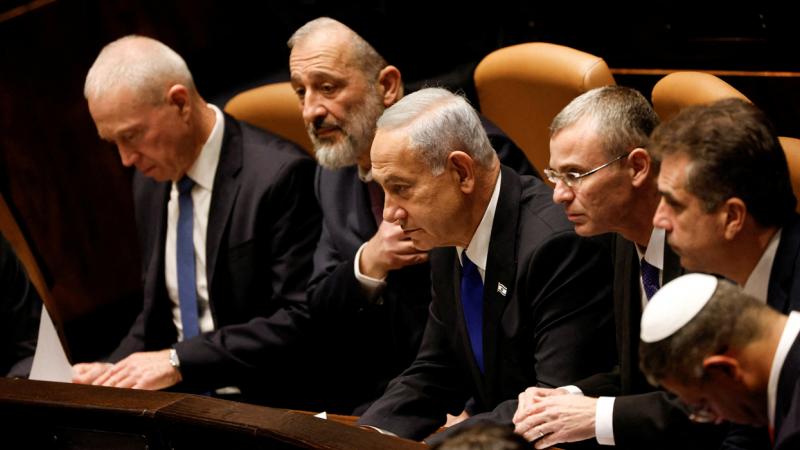Netanyahu: From Maintaining the Status Quo to Imposing a New Reality by Force
August 10, 202583 ViewsRead Time: 3 minutes

Font Size
16
In a significant strategic shift, Israel under the leadership of Benjamin Netanyahu is no longer content with the role of "guardian" of the status quo in the Middle East, but is increasingly seeking to redraw the map of the region by military force, according to an in-depth analysis published by Foreign Policy magazine. This analysis tracks how Israel has shifted from a strategy of limited strikes to contain threats to its pursuit of "total victory" and regime change through escalation in Syria, where it launched more than 160 airstrikes in 24 hours during the events in Sweida (July 2024), under the pretext of protecting the Druze.
Expanding direct military presence in Syrian territories and occupying nearly 200 km², in addition to repeated strikes against Iranian positions in Syria and Lebanon, aimed at crippling the capabilities of the "Axis of Resistance".
It has worked hard to thwart ceasefire initiatives in Gaza and reject any political settlement with the Palestinians.
Netanyahu believes that the overthrow of hostile regimes (such as Hamas in Gaza and Hezbollah in Lebanon) and weakening Iran will impose a "new Middle East" in which Israel is the dominant power, with widespread Arab normalization. However, this vision faces major challenges such as popular Arab rejection of normalization, especially after the war on Gaza. And the concerns of Western allies (such as the United States) about the region sliding into a full-scale war.
It seems that Netanyahu rejects diplomacy because he bets on military power and believes that Israel's technological and military superiority allows it to impose its terms without negotiations.
Israel's desire to change regimes in the region is evident, as shown in statements by Israeli ministers calling for the overthrow of the new Syrian president (Ahmad al-Shara) or even "liberating" Northern Cyprus from Turkey and benefiting from American support.
Despite some American officials' criticisms of Netanyahu, the Trump administration did not halt military and political support for Israel.
Israeli escalation may achieve tactical victories, but it deepens strategic problems such as eroding normalization opportunities, as Arab countries will not risk the anger of their peoples in favor of Israel, especially after the indiscriminate strikes in Syria and Gaza that increased regional hostility. Even Washington has made it clear that it does not want a regional war initiated by Israel that drags it into conflict.
The Israeli shift towards imposing facts on the ground by force may achieve short-term gains, but it threatens to isolate Israel internationally due to its repeated violations of international law and prolonging conflicts in Gaza, Lebanon, and Syria without political solutions, as everyone knows that undermining regional stability could push the region into dire confrontations.
Expanding direct military presence in Syrian territories and occupying nearly 200 km², in addition to repeated strikes against Iranian positions in Syria and Lebanon, aimed at crippling the capabilities of the "Axis of Resistance".
It has worked hard to thwart ceasefire initiatives in Gaza and reject any political settlement with the Palestinians.
Netanyahu believes that the overthrow of hostile regimes (such as Hamas in Gaza and Hezbollah in Lebanon) and weakening Iran will impose a "new Middle East" in which Israel is the dominant power, with widespread Arab normalization. However, this vision faces major challenges such as popular Arab rejection of normalization, especially after the war on Gaza. And the concerns of Western allies (such as the United States) about the region sliding into a full-scale war.
It seems that Netanyahu rejects diplomacy because he bets on military power and believes that Israel's technological and military superiority allows it to impose its terms without negotiations.
Israel's desire to change regimes in the region is evident, as shown in statements by Israeli ministers calling for the overthrow of the new Syrian president (Ahmad al-Shara) or even "liberating" Northern Cyprus from Turkey and benefiting from American support.
Despite some American officials' criticisms of Netanyahu, the Trump administration did not halt military and political support for Israel.
Israeli escalation may achieve tactical victories, but it deepens strategic problems such as eroding normalization opportunities, as Arab countries will not risk the anger of their peoples in favor of Israel, especially after the indiscriminate strikes in Syria and Gaza that increased regional hostility. Even Washington has made it clear that it does not want a regional war initiated by Israel that drags it into conflict.
The Israeli shift towards imposing facts on the ground by force may achieve short-term gains, but it threatens to isolate Israel internationally due to its repeated violations of international law and prolonging conflicts in Gaza, Lebanon, and Syria without political solutions, as everyone knows that undermining regional stability could push the region into dire confrontations.